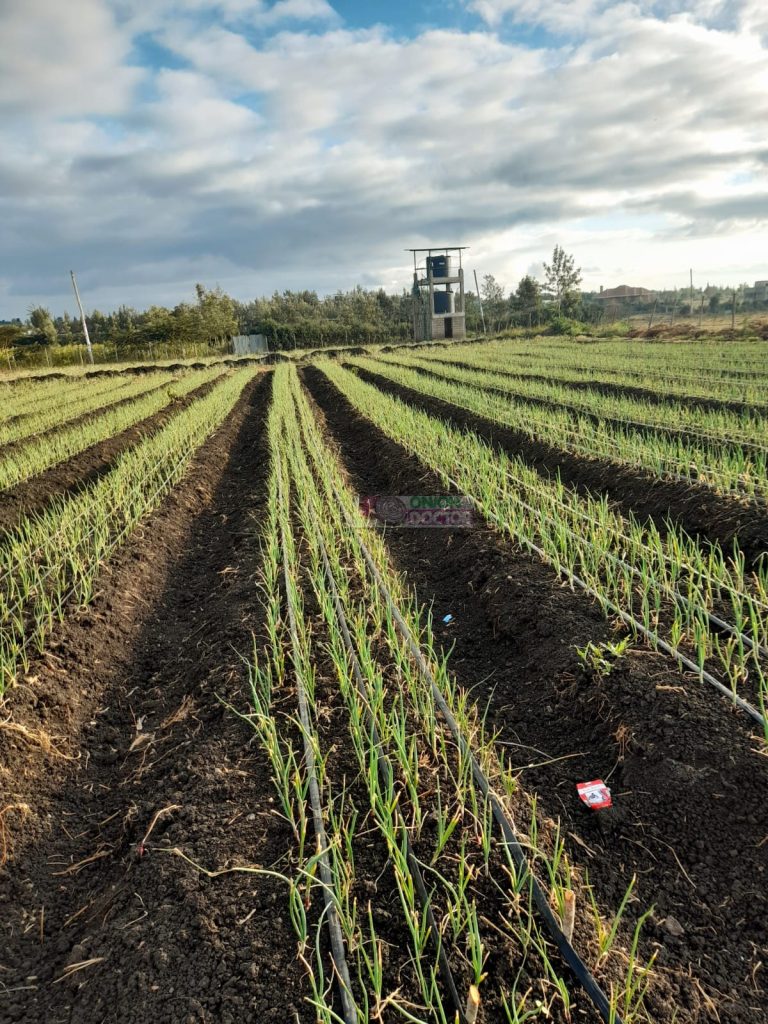
Are you in need of in-depth knowledge on onion and garlic production? If yes, we are a call away. Contact us for: Onion seedlings, Garlic seedlings, Germinated garlic cloves, Farm planning services, Soil testing, training on onion and garlic growing, Drip irrigation installation and maintenance, Agronomic support, Onion and Garlic value pack and Farm management. For free consultation, placing orders or booking a visit with an agronomist, please contact us via Call or what’s app +254703982228, Email: Info@oniondoctor.co.ke. You can also check out our social media handles for daily updates on TikTok: https://www.tiktok.com/@oniondoctorke?_t=ZM-8wmsTu0qumO&_r=1 Instagram: https://www.instagram.com/oniondoctorke?igsh=MTVoaHF3aWUydTJzaQ==Facebook:https://www.facebook.com/share/16SwgYn2dG/ Youtube:https://youtube.com/@oniondoctorke?si=u5Jnd-r0qU9UDYqL and Twitter: https://x.com/OnionDoctorKe?t=FR3JXlS_oN1vjjUgAtfyzg&s=09
Bulb onions have a significant market demand in Kenya, primarily driven by small-scale cultivation. However, the produce from local farmers is insufficient to meet the rising demand for onion bulbs. Low production stems from poor onion farming practices and unfavorable growing conditions in many regions.
Optimal Conditions for Growing Bulb Onions in Kenya
To grow bulb onions successfully in Kenya, certain conditions must be met:
- Soil: Well-drained soil with a pH between 6.0 and 6.8 is ideal.
- Temperature: Onions thrive in temperatures ranging from 13 to 35°C.
- Altitude: An altitude between 500 and 1200 meters above sea level is optimal for onion growth.
Varieties of Bulb Onions to Grow in Kenya
Popular onion varieties in Kenya include:
- Red Couch
- Africa Red
- Neptune
Essential Steps for Growing Bulb Onions in Kenya
1. Seedling Propagation
Successful onion farming begins with effective seedling propagation. Onion Doctor recommends using either seedling beds or seedling trays for propagation.
How to Propagate Seedlings in Beds
- Prepare seedling beds, about 30-50 cm high, and mix the soil with manure.
- Make small trenches, sow the seeds, and cover with mulch.
- Irrigate gently to moisten the soil.
- Once the seedlings germinate, remove the mulch to promote growth.
How to Propagate Seedlings in Trays
- Mix soil with compost manure and cocopeat dust.
- Fill seedling trays with the mixture, sow the seeds about 1 inch deep, and place the trays in a protected structure like a shade house.
- Water frequently until germination occurs (7-10 days).
2. Transplanting the Seedlings
Once seedlings reach about 15 cm in height (after 6 weeks), they are ready for transplanting. Onion Doctor advises transplanting seedlings into holes 10-15 cm deep and 15 cm apart. Water immediately after transplanting and ensure continuous irrigation.
Why Use an Onion Doctor Drip Irrigation Kit
In some regions, rainfall is insufficient to grow bulb onions effectively. Drip irrigation is highly recommended to provide onions with the precise amount of water they need. Onion Doctor offers specialized drip irrigation kits designed for onion farming, ensuring efficient water usage and improved yields.
Tips for Growing and Watering Bulb Onions
- Irrigation: Use drip irrigation for optimal water delivery to your plants.
- Bulb Formation: Increase water application during the bulb formation stage to support healthy growth.
How to Grow and Harvest Onions at the Right Time
To meet the high market demand for onions in Kenya, it’s essential to plant at the right time. Onion Doctor suggests planting in August and harvesting in December. Harvest on dry days to avoid bulb rot, and begin when the leaves die, indicating the bulbs are ready.
Common Challenges and Solutions for Growing Bulb Onions in Kenya
- Excessive Irrigation: Leads to stagnant growth.
Solution: Use drip irrigation for precise watering. - Downy Mildew: A fungal disease caused by over-irrigation.
Solution: Reduce irrigation and use recommended fungicides. - Weed Growth: Competes with onions for nutrients and water.
Solution: Apply appropriate herbicides, such as Governor. - Pests (e.g., Thrips): Affect foliage and bulb formation.
Solution: Use effective pesticides.
How Onion Doctor Supports Farmers
Onion Doctor assists smallholder farmers across Africa with high-quality, affordable onion and garlic seedlings. We offer services like:
- Onion seedling supply
- Farm planning and soil testing
- Drip irrigation installation and maintenance
- Agronomic support and farm management
- E-extension and on-farm training
By partnering with Onion Doctor, farmers can optimize their yields, grow bulb onions more efficiently, and meet Kenya’s high market demand.